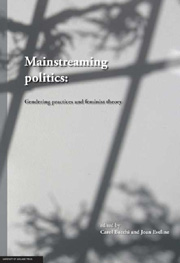Book contents
- Frontmatter
- Contents
- Preface
- Personal reflection
- Publisher's note
- List of authors and project personnel
- Acknowledgements
- Introduction
- 1 Gender/ing impact assessment: Can it be made to work?
- 2 Mainstreaming and neoliberalism: A contested relationship
- 3 Gender analysis and social change: Testing the water
- 4 What are we mainstreaming when we mainstream gender?
- 5 Approaches to gender mainstreaming: What's the problem represented to be?
- 6 Power, resistance and reflexive practice
- 7 Gender mainstreaming: The answer to the gender pay gap?
- 8 Gender analysis and community participation: The role of women's policy units
- 9 The invisibility of gendered power relations in domestic violence policy
- 10 Gender mainstreaming versus diversity mainstreaming: Methodology as emancipatory politics
- 11 University-public sector research collaboration: Mine the space, never mind the gap
- 12 Obeying organisational ‘rules of relevance’: Gender analysis of policy
- 13 Gender mainstreaming or diversity mainstreaming? The politics of ‘doing’
- Conclusion A politics of movement
- Author Index
- General Index
5 - Approaches to gender mainstreaming: What's the problem represented to be?
Published online by Cambridge University Press: 05 June 2012
- Frontmatter
- Contents
- Preface
- Personal reflection
- Publisher's note
- List of authors and project personnel
- Acknowledgements
- Introduction
- 1 Gender/ing impact assessment: Can it be made to work?
- 2 Mainstreaming and neoliberalism: A contested relationship
- 3 Gender analysis and social change: Testing the water
- 4 What are we mainstreaming when we mainstream gender?
- 5 Approaches to gender mainstreaming: What's the problem represented to be?
- 6 Power, resistance and reflexive practice
- 7 Gender mainstreaming: The answer to the gender pay gap?
- 8 Gender analysis and community participation: The role of women's policy units
- 9 The invisibility of gendered power relations in domestic violence policy
- 10 Gender mainstreaming versus diversity mainstreaming: Methodology as emancipatory politics
- 11 University-public sector research collaboration: Mine the space, never mind the gap
- 12 Obeying organisational ‘rules of relevance’: Gender analysis of policy
- 13 Gender mainstreaming or diversity mainstreaming? The politics of ‘doing’
- Conclusion A politics of movement
- Author Index
- General Index
Summary
Introduction: Carol Bacchi and Joan Eveline
Previous chapters have made reference to the need to rethink policy as a creative (productive or constitutive) process. The major purpose of this chapter is to clarify what this means and to illustrate the usefulness of this way of thinking about policy for studying gender mainstreaming and gender analysis. The specific focus is ‘gender proofing’ in Ireland and ‘gender impact assessment’ in the Netherlands.
The underlying proposition in thinking about policies as productive, or as constitutive, is that policies and policy proposals give shape and meaning to the ‘problems’ they purport to ‘address’. That is, policy ‘problems’ do not exist ‘out there’ in society, waiting to be ‘solved’ through timely and perspicacious policy interventions. Rather, specific policy proposals ‘imagine’ ‘problems’ in particular ways that have real and meaningful effects. Hence, to understand how policies operate requires that we ask of policy proposals ‘What's the Problem represented to be?’. This question forms the starting place for Bacchi's (1999; 2009a) novel method of policy analysis (elaborated below), captured in the acronym WPR.
The proposition that ‘problems’ do not ‘exist’ ‘out there’ in society does not ignore or downplay the full range of troubling conditions, including the subordination of women, that characterise social relations. Instead, it insists that how ‘problems’ are represented in policies – how they are discursively produced – affects the particular understanding given to those conditions at points in time and space, and that these understandings matter.
- Type
- Chapter
- Information
- Mainstreaming PoliticsGendering Practices and Feminist Theory, pp. 111 - 138Publisher: The University of Adelaide PressPrint publication year: 2010
- 2
- Cited by

